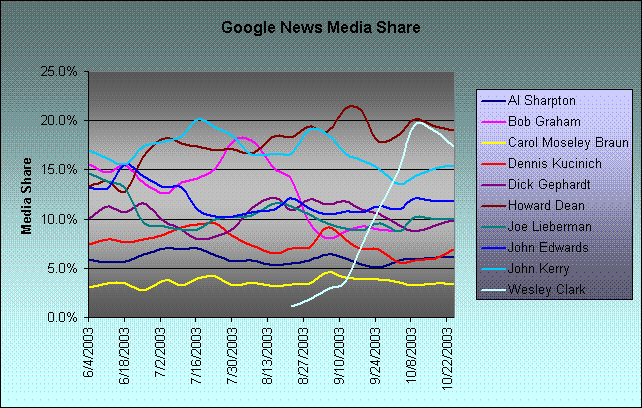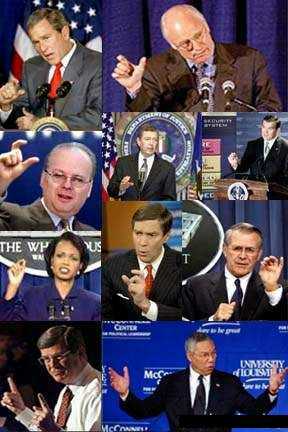There are two fascinating articles online that discuss the deeper meanings of
the Dean campaign. The first is an American Prospect article by Garance
Franke-Ruta ("Shock
of the Old") and the second is a Village Voice article by Kareem Fahim
("The Army of
Dean"). If you have time to read only one I would recommend the
Franke-Ruta article.
There have been plenty of column inches written about how different the Dean
campaign is, but I think Franke-Ruta's is the most original and intriguing take
on it that I have ever read. He puts forward the thesis that Dean's campaign
harkens back to an old tradition in American democracy: the New England
Liberalism of the 18th and 19th century. There are two many good points in his
article to highlight just one, but just to give you a sample:
This quality in Dean's rhetoric -- that he is appealing not just to
people's partisan leanings, nor to their particular ethnic or gender
identities but to their history and identity as Americans -- is what has made
him compelling to so many liberal voters who feel America is no longer even
trying to be a "City upon a Hill." Instead of fearing the legacy of
northeastern liberalism, he has embraced it as the philosophy that founded
contemporary democracy, created America, kept it whole during the 19th century
and fought to expand the franchise so that African Americans and women could
participate as full citizens. When the other presidential contenders have
tried to reach back past the Great Society, it has often been to connect with
the last northern Democratic president, John F. Kennedy. And Dean? In the
Boston speech, he quickly mentioned the 1960s and the New Deal -- but he built
his address around the Sons of Liberty, who had carried out the Boston Tea
Party. At his formal announcement speech, he skipped past JFK and went all the
way back to John Winthrop, a Puritan settler, theologian and early governor of
the Massachusetts Bay Colony, quoting these words: "We shall be as one.
We must delight in each other, make others' conditions our own; rejoice
together, mourn together, labor and suffer together."
This return to origins is, to be sure, partly typical political
calculation. "You get beat by not wrapping yourself in American
history," says Dean's campaign manager, Joe Trippi. But part of it is
also a genuine effort by the campaign to imbue Dean's argument with "a
foundation in the history of the country" at a time when democratic
practices seem increasingly subject to contestation from the right.
"We've got to remind people of why we are the kind of country we
are," says Trippi. "We've gotten so far away from some of the
original principles."
Dean is spear-heading an effort to reclaim that heritage and assert that the
South isn't the only part of America that counts. The idea of America started in
New England after all. As Franke-Ruta points out, the Meetup phenomena is
similar in many ways to the New England town hall.
I've been mulling an idea in my mind that Dean is the real conservative in
this race because he wants to bring us back to a tradition of participatory
Democracy that has become increasingly out of favor in our modern society. What
could be more conservative than to say that the original model for American
Democracy is still the best?
The title of Dean's announcement speech was "The Great American
Restoration". Some have interpreted his campaign as simply a reversal of the
radical agenda of the Bushies. I think Dean is looking
back much further than that.
Update: I almost forgot. While I was reading Franke-Ruta's article I
was struck by something that I hadn't given much thought to: Dean's religiosity.
I had heard that he was a Congregationalist, but I hadn't heard much else about
his faith tradition beyond its name. Dean rarely ever invokes God in his
speeches. This is something I have always found refreshing, but I've sometimes
wondered if it might be held against him in some more religious regions of the
country.
Franke-Ruta's article makes me wonder whether the minimalist approach to
religiosity might actually be a defining characteristic of Dean's faith. But
that does not mean that Dean isn't a deeply religious man. Franke-Ruta comments
on the religious zeal of Dean's appearances despite the pronounced lack of any
mention of God. He even goes so far as to call Dean a "northern
evangelist". Dean preaches the faith by invoking God's spirit more than his
name.
Does anyone else have enough experience with Congregationalism to comment on
this?








